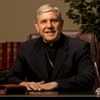
Most Reverend Jerome E. Listecki
Archbishop of Milwaukee
February is Black History Month. The airwaves and various media outlets use this opportunity to introduce us to various historical figures who have made significant contributions to Black history in the United States. I would like to use this week’s LOA to thank a few individuals who have contributed to my understanding of the Black Catholic community.
When I was fourteen years old, I was beginning my minor seminary training at Quigley Preparatory Seminary South. Major seminarians from Mundelein invited a group of us to assist in the summer program at Holy Angels Parish on the south side of Chicago. Holy Angels was the largest Black parish in the Archdiocese of Chicago, and you may know it from the national reputation it gained in the 70s under Fr. George Clements.
However, this was 1963 and the pastor was Fr. Joe Richards. His dedicated ministry to the Black community was widely noted and very respected. The civil rights movement was just gaining momentum and Fr. Richards would use Holy Angels as a meeting point for many of the local and national leaders in the movement. He was a great icon for breaking down stereotypes and understanding the importance and uniqueness of the Black community.
In 1973, while I attended major seminary, Fr. Raymond Cusack invited me to work in his parish, Presentation, which was on the west side of Chicago in the Cabrini Green area. He was completely dedicated to the community he served. If there was a saintly figure who he embodied, it would easily be St. Francis of Assisi. It is one thing to experience poverty, but it is another thing to understand its roots. Fr. Ray lived in union with his community and made decisions in coordination with the leadership of the parish. Under the direction of Fr. Cusack, the exercise of ministry at Presentation was something that I incorporated into my priestly life. Fr. Ray died after preaching a homily on the Blessed Mother on the feast of the Assumption. I imagine that Mary was standing to the right of St. Peter at the Pearly Gates proclaiming, “He is one of mine.”
I fell in love with a sport that has long been associated with the seminary, basketball. It may sound strange, but this sport was also an introduction for me to the Black community. If you wanted to play at a top-level, you needed to play with Black athletes. I was blessed to play with some very exceptional players. There were two players at the college level, Rudolph Harper and Dennis Riley, whose memories I continue to carry in my heart to this day. Each man was distinctly different, but each contributed to my life.
Dennis was your consummate team player. He gave 110% in practice and on game day. He did whatever was necessary for the team to succeed. He was never the center of attention, but he did not need to be. He was your teammate and took as much pleasure in the other person’s achievement as he did in his own. He became a priest and took that sense of teamwork into his parish. He died too early, but his funeral was a tribute to the personal and selfless sacrifices he made.
Rudolph Harper was one of the best players that I had the privilege to share the basketball court with. His talent was respected by all, and he was a natural-born leader. Leaving the seminary, he became a community organizer who placed his skills at the disposal of men and women who needed a role model. He would not be swayed by popular mores but assessed and evaluated directions in what would promote the best of the community. Our lives were often pulled in different directions, but Rudi always found time to call, informing me of friends who had died or were ill. Any time I was making a move and entering a new community, Rudi was there lending his support.
Both Rudolph Harper and Fr. Dennis Riley were men of integrity, and their character embodied the best of our Catholic Faith and Christian values. Their Black heritage gave them a strength that said loudly and proudly that they were second to none. I was privileged to call them friends.
Augustus Tolton, the first publicly known Black Catholic priest (1886-1897), started parish communities in the Midwest. He was a tremendous preacher. He suffered the prejudices experienced by people of color in our society but, even more so, by the separatism from the white Catholic parishes and even from fellow Black Evangelicals who objected to his Catholicism. His commitment to Christ made him rise above all of his detractors. His eye was on the ultimate prize, sanctity. One of our very own, Bishop Joseph Perry, is promoting his cause for sainthood. I pray that his canonization will happen soon. He is a great example for those who must struggle against adversity from outside and from within.
During this Black History Month, I pray that our parishes here in the Archdiocese of Milwaukee that serve the Black communities will always be living examples of Christ’s direction to LOVE ONE ANOTHER.
Note: This blog originally appeared as the February 23, 2021 "Love One Another" email sent to Catholics throughout the Archdiocese of Milwaukee by Archbishop Jerome E. Listecki. If you are interested in signing up for these email messages, please click here.